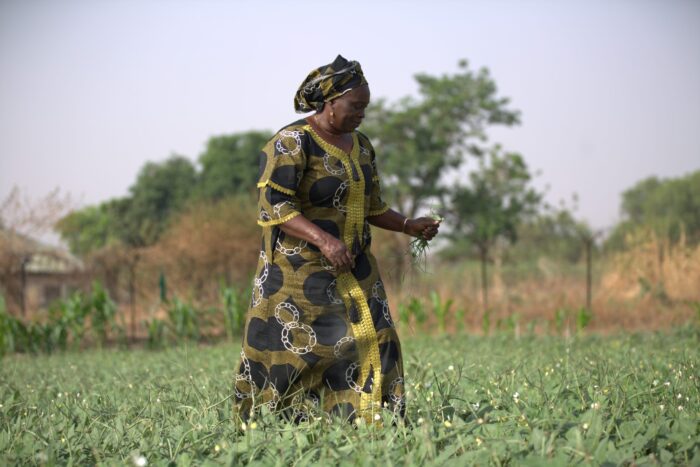By Onche Odeh
Nigerian farmers and food vendors have been savouring the benefits of the new varieties of cowpea popularly known in the country as beans, and maize developed by scientists at the Institute of Agricultural Research (IAR), Ahmadu Bello University (ABU), Zaria, Kaduna State, saying they are the game changers that they have desired for a long time.
Nigeria made history in December 2019 with the release of the Pod Borer Resistant (PBR) Cowpea as SAMPEA 20-T variety after ten years of research, scientific and safety due diligence through strategic partnerships coordinated by the African Agricultural Technology Foundation (AATF).
This was taken a notch higher in 2023 with the commercialization of PBR Cowpea. This was followed a year later with the approval and commercial release of TELA Maize in Nigeria.
PBR Cowpea, which is the first genetically modified (GM) food crop adopted in Africa outside of South Africa, is resistant to the insect pest, Maruca vitrata, which is responsible for up to 80 percent yield losses., while TELA Maize is resistant to the fall army worm and tolerant to drought, two twin factors that have caused painful losses to farmers in the country and other parts of Africa.
Whereas the commercialization of PBR Cowpea in Nigeria was swiftly accepted, such was not the case with TELA Maize, as its launch in June 2024 unearthed a barrage of vilification and protests by anti-GMOs groups.
Strangely, the series of campaigns that resulted in a public hearing at the lower legislative arm of Nigeria’s National Assembly has been shrugged off by farmers in the country, who have come out to say that, beyond just farming the GM crops, they also consume them alongside their families with no fear of being harmed as claimed by groups opposed to the genetically modified organisms.
Judith Okpanachi, a female farmer from Kwali Area Council in Nigeria’s Federal Capital Territory (FCT), is one the farmers who say they have moved beyond the negative narratives about the GM crops introduced so far in Nigeria.
Speaking during a recent interview in Abuja, Mrs Okpanachi said she was introduced to PBR Cowpea by a friend three years ago, and since then she has been relishing the benefits.
For someone who is married to a big farmer, Mrs Okpanachi said it seemed like an irony that she hated going to the farm, especially the beans farm because of the stress of tending the crop from looses due to attacks from the pod borer and other pests.
“I am married to a big farmer who farms almost every common food crops with beans being one of the largest, I hated working on the beans farm because it involved stressful spraying, which we do as many as five times from the time of cultivation to harvest. Yet we would still not be able to stop the farm from being attacked by pests.
“But three years ago, a friend introduced the PBR Cowpea to me. I started with just one mudu, which is approximately 1.2kg and got about 20 mudus. What is most intriguing is that I sprayed for only thrice as a psychological precautionary measure. With PBR Cowpea, I wasn’t stressed at all,” Okpanachi said.
Mrs Joyce Seke Ampitan, a food vendor turned farmer also shares similar experience in a separate interview.
Mrs Ampitan who has been a food vendor until she was introduced to the PBR Cowpea during one of her business outings a couple of years ago, has never looked back in the farming and consumption of the Beans.
But with a massive land bequeathed to her as inheritance in her home town in Kogi State after the demise of her father, Mrs Ampitan was left with a slim option of what to do, as the land was located in a place that could be suitable for farming.
According to her, she has previously tried cultivating other crops, but found the ‘hook’ in PBR Cowpea.
“After the death of my dad, I was given a large portion of land as my own share of inheritance. All the while, I have been thinking about what could be the best thing to do with the land until when I was introduced to PBR Cowpea, while I was offering catering services to the National Agricultural Biotechnology Research and Development Agency (NBRDA),” Mrs Ampitan said in her interview.
She said, “While I was going about my business, I took time to listen to the things that were said about the new beans variety and summorned the boldness to request samples of the seeds, which I tried on the farm land.
“The harvest was very impressive, and I did not have to spend so much in spraying. So, at that point, I decided to go full throttle with farming PBR Cowpea. And since then, I have been farming it and we have been eating it.”
Mrs Ampitan is so proud of the PBR Cowpea that she has made branded apparels with the coinage ‘We farm It, We Cook It. You Love It’ to reflect the different satisfaction she and her patrons have derived from the cultivation and consumption of the new variety of beans, which she serves in her busy restaurant located in Maitama, a busy high-brow location in Nigeria’s capital city of Abuja.
Mrs Ampitan and Mrs Okpanachi share similar testimonies about the PBR Cowpea.
According to both, the beans comes in full measures in the pod during planting and harvest, and does not get moulded when cooked. They also say the cake made from it is as tasty as those made from the conventional black eyed variety.
“The leaves would come out fine, and the spraying was just thrice, not stressful. In fact the spraying was just a psychological boost,” Mrs Okpanachi recalled her first time experience with the cultivation of the PBR Cowpea. Similar testimony was shared by Mrs Ampitan.
Like Mrs Okpanachi and Mrs Ampitan, many Nigerian farmers have adopted the GM bean and maize varieties, citing their ease of cultivation, higher yields, and improved pest resistance.
The PBR Cowpea, in particular, has been a game-changer for many farmers, offering protection from the pod borer pest, which can cause up to 80% yield losses.
Nigeria has been Africa’s biggest producer of cowpea, with an estimated grain production of 3.1 million tonnes annually. Ironically, the country has been in deficit in attempt to meet local demands, as an additional 500,000 tonnes is required annually to meet the domestic demand. The introduction of GM bean and maize varieties has been seen as a potential boost to this effect.
Like the PBR Cowpea, Nigerian farmers have also found solace in TELA Maize, regardless of the negative narratives that have been propagated about it since it was introduced over one year ago.
Olaseinde Idowu, is a retired as Deputy Director with the Agriculture Development Programme (ADP) of the Federal Capital Territrory (FCT), who has, over time, mentored many farmers on modern farming.
He said Nigerian farmers do not really care about the negative narratives about PBR Cowpea and the TELA Maize.
Pointing to Zhitsu Mohammed , a farmer from Niger State who he once mentored, Olaseinde said, “Mohammed planted more than one hectare of PBR Cowpea in Kuje, then he sent another batch to Bida, Niger State where he feels they are more secured. He is so jealous of the TELA Maize seeds that he would do anything to secure them, which is the reason he has opted to keep them in Bida against the coming farming season.”
Mohammed affirmed this in an interview with AfricaSTI.
“I have been farming for over 20 years now. It has been a mixed experience, as most times I am forced to spray many times to prevent insects, pests and diseases from attacking my crops. This is usually very expensive, especially for maize. I used to spray not less than five times over a one hectare farm every year. This takes over two hundred thousand naira to do, at the end I may just get about 50kg,” he said while narrating what he faces in the past farming conventional varieties of maize prior to being introudced to TELA Maize one year ago.
He said, “TELA Maize was introduced to me about a year ago. After planting, I only needed to spray twice which is just for caution. At the end, I realised that the harvest was five times more than what I used to get.”
Mohammed said he still has some TELA Maize seeds which he is guarding jealously and would be getting more for the current planting season.
Meanwhile, Idowu has said that, “With the right agronomic practices, farmers like Mohammed are raking bountiful harvest. They cannot wait for the next planting season,.
He said the farmers are most intrigued about the ability of TELA Maize variety to withstand the fall army worm, which seemed insurmountable until now.
While many farmers have welcomed the new GM crops, some have expressed concerns about access to certified seeds.
“The government must do enough to make certified seeds available to farmers,” Idowu said.
Experts have said the introduction of GM bean and maize varieties is a significant step towards improving Nigerian agriculture. With the potential to increase yields, reduce pesticide use, and enhance food security, they say these new crops offer a promising future for Nigerian farmers and food vendors.





